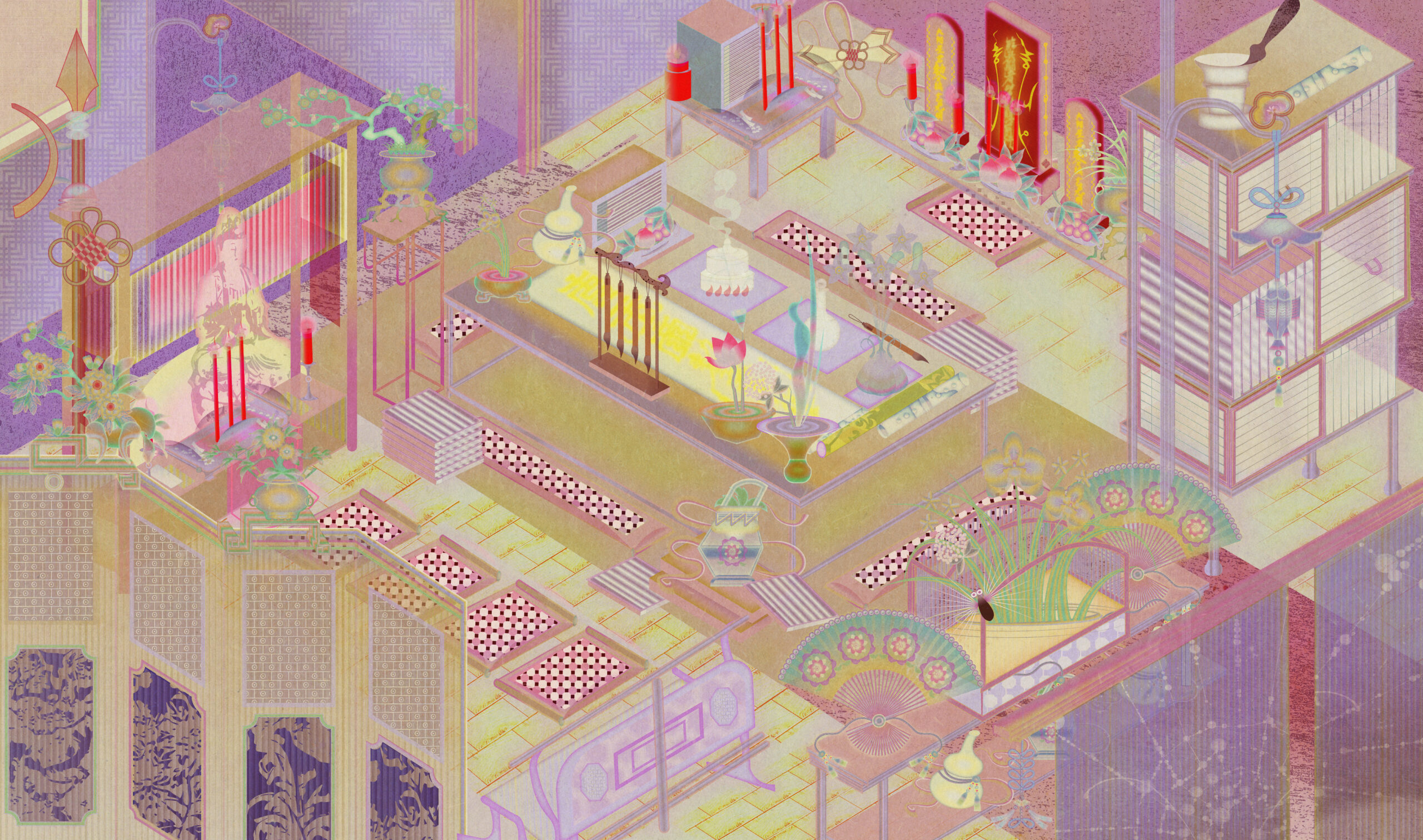ZHANG DING: OPENING
| October 7, 2011 | Post In LEAP 10

Upon entering Zhang Ding’s exhibition “Opening,” the artist duo Elmgreen & Dragset’s piece The Mirror immediately springs to mind. Three years ago, as part of the installation series “Too Late,” The Mirror transformed London’s Victoria Miro Gallery into a “nightclub,” complete with sofas, dancefloor, discoball, DJ booth, cloak room and bathrooms. At “Opening,” one first passes through a labyrinth of red corridors lit by three blindingly bright LED installations embedded into the walls that perhaps hint at the artist’s previous work with lightbulbs. The corridors eventually give way to a much wider space, which preserves the nightclub feel. From within a booth encircled by shimmering disco balls, a DJ plays dance music, and on a podium built like the stage of an awards ceremony, girls in black corsets dance in rotation. Elsewhere, the sculpted busts of two young men hang from a custom built red frame, and a carved wooden girder and another uneven structure are held up by sculptures of two young women. Each of these seemingly perform the role of nightclub bar or dance podium, and essentially make up the entirety of the opening.
The principal intention of “Opening” is to enact a critique of the contemporary ceremonial phenomenon of the “opening party.” The arrangement of items within the gallery space has been meticulously confused: this place couldn’t actually host a press conference, catwalk show, or club night. Zhang Ding has appropriated the visual and conceptual framework of a ceremony in pursuit of a specific visual lingua franca, atmosphere and set of social rituals.
At art show openings, looking at and discussing work (and the exhibition) often become phatic acts in themselves. When social dialogue and the rituals of the ceremony come to dominate the setting, the content of the exhibition itself is stripped away, leaving an environment indeed totally defined by social interaction. Another interesting point magnified by the phenomenon of the contemporary art exhibition: how does the opening, from artistic discourse to marketing of works, become part of artistic creation and exhibition?
Elmgreen & Dragset’s “Too Late” stuck close to reality, meticulously fabricating a club scene, albeit one devoid of activity. The installation effectively encapsulated the definitive role of the nightclub in youth culture: every inch of the space explicitly evoked the appropriate function and aesthetic to a place of revelry. Zhang Ding’s club, by contrast, seems more like something out of a designer’s dream, in every way more beautiful than its counterpart in reality.
Theoretically, the exaggerated role of the ceremony, as well as the construction of its narrative, could be seen as an attempt at satire. But what the space reveals through its overall design, props, characters and choreography seems carelessly designed, unconsidered and hence untenable. In his “gymnastic apparatus” sculptures, the artist’s intention was apparently to portray “the objectification of the standards of beauty.” But they unintentionally revealed something else, equally strong though less easy to identify: though Zhang Ding attempts to criticize “standards of beauty” via gymnastic figures, such formal and compositional standards can actually be found in all of the artist’s work, which often possess a ready-made or subtle transformative quality and often allude to the socialist realist archetype of young, robust figures. As a result, his “standard of beauty” is incompatible with the club environment.
And so the confused spectators of this “opening” were caught between two rather separate narrative threads: the sculptures, and the environment that beheld them. Unable to perform the relevant social rituals, they stood around, clumsily trying to participate in the artist’s plan of action. One feels that in this exhibition, the artist has tried to say too much: even if the audience were to have essentially comprehended his intentions, as soon as the music started blasting out, Zhang Ding lost control. Leo Xu (Translated by Dominik Salter Dvorak)

